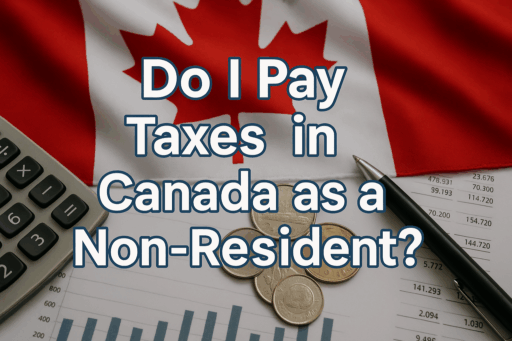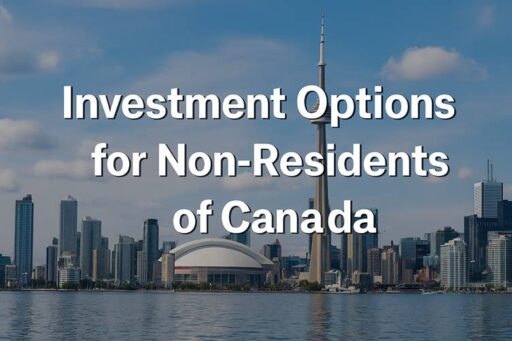Canada has emerged as one of the world’s most attractive investment destinations for non-residents.
The country offers political stability, robust regulatory frameworks, and diverse investment opportunities.
According to recent data, Canada attracted USD 50.3 billion in foreign direct investment in 2023.
This represents a 9% increase year-on-year, making Canada the sixth-largest FDI recipient globally.
Non-residents can successfully invest in Canadian markets despite certain restrictions and tax implications.
The country’s strong banking sector, resource-rich economy, and commitment to free trade create compelling opportunities.
However, understanding the regulatory landscape and tax obligations is essential for successful investment outcomes.
In this article, we are going to discuss:
- Is it worth investing in Canada?
- Can a non-resident invest in Canada?
- Do non-residents pay tax in Canada?
- Investments in Canada for non-residents
If you are looking to invest as an expat or high-net-worth individual, which is what I specialize in, you can email me (hello@adamfayed.com) or WhatsApp (+44-7393-450-837).
This includes if you are looking for a free expat portfolio review service to optimize your investments and identify growth prospects.
Some facts might change from the time of writing. Nothing written here is financial, legal, tax, or any kind of individual advice or a solicitation to invest.

Is Canada Good for Investing?
Canada consistently ranks among the world’s top investment destinations.
It ranked 19th in the IMD’s World Competitiveness Index, first in population growth, and fifth in quality of life.
These factors underline strong, sustainable market potential.
Its corporate tax rate is among the lowest in the G7, attracting multinationals and boosting shareholder returns.
In 2021, Canada drew USD 59.6 billion in FDI, a 157% jump over 2020 (UNCTAD, 2022), reflecting solid investor confidence.
Investors should note, however, that Canada’s market is smaller than the US.
It is also heavily weighted toward financial institutions and energy sectors, which may limit diversification.
Can Non-Residents Have Investments in Canada?
Non-residents can maintain and establish various types of investment accounts in Canada, albeit with restrictions.
Most financial institutions allow existing account holders to maintain their investments after becoming non-residents.
However, opening new investment accounts as a Canadian non-resident presents significant challenges and limitations.
Account maintenance versus new account opening represents a crucial distinction for non-resident investors.
Investment portfolios and regular brokerage accounts also remain accessible to former Canadian residents living abroad.
Financial institutions vary significantly in their willingness to work with non-resident clients and investors.
Some institutions demonstrate greater flexibility in accommodating non-resident investment needs than others.
This variation makes it essential to research institutional policies before making investment decisions.
Can a non-resident buy mutual funds in Canada?
Canadian non-residents face specific restrictions on purchasing new Canadian mutual funds after departure.
They cannot buy new Canadian mutual funds but can continue holding existing fund positions.
This restriction limits portfolio diversification options for non-residents seeking Canadian market exposure.
Non-residents can build diversified portfolios using publicly traded securities.
Real estate investment opportunities exist for non-residents, though provincial regulations may apply.
Foreign buyer taxes have been implemented in certain provinces and municipalities.
These additional costs must be factored into real estate investment calculations and expected returns.
Can a non-resident have an investment account in Canada?
Investment account types available to non-residents include regular taxable investment accounts and certain registered accounts.
Tax-Free Savings Accounts (TFSAs) become off-limits for contributions once non-resident status is established.
Registered Retirement Savings Plans (RRSPs) may still accept contributions under specific circumstances.
The Investment Canada Act governs foreign investment in Canadian businesses and certain sectors.
Non-residents must comply with these regulations when making significant business investments or acquisitions.
Threshold amounts and sector-specific rules determine when government review and approval become necessary.
Do I Pay Taxes in Canada as a Non-Resident?

Non-resident investors face specific tax obligations on Canadian-source investment income and capital gains.
Withholding tax rates vary depending on the type of income generated from Canadian investments.
Understanding these tax implications is essential for accurate return projections and investment planning.
Interest income from Canadian sources is subject to 10% withholding tax for non-residents.
This applies to income from fixed deposits, guaranteed investment certificates, and bond interest payments.
The withholding tax is deducted at source before payment to the non-resident investor.
Dividend income and trust distributions face 15% withholding tax under standard Canadian tax rules.
This rate applies to dividends from Canadian corporations and distributions from mutual funds or ETFs.
The tax is automatically deducted from dividend payments to non-resident shareholders.
Capital Gains
Capital gains present a unique advantage for non-resident investors in Canadian securities and investments.
No withholding tax applies to capital gains realized by non-residents on Canadian investments.
This favorable treatment can significantly enhance after-tax returns compared to income-generating investments.
Tax Filing Requirements Canada
The filing requirements for non-residents differ substantially from those applicable to Canadian residents.
Non-residents typically only file Canadian tax returns for specific income types like rental property.
Investment income subject to withholding tax generally does not require return filing.
How to Avoid Double Taxation in Canada?
Double taxation occurs when the same income is taxed in both Canada and the investor’s country of residence.
Tax treaty provisions represent the primary mechanism for avoiding or reducing double taxation impacts.
These bilateral agreements specify which country has taxing rights for different income types.
Foreign Tax Credits
Foreign tax credit systems allow non-residents to claim Canadian withholding taxes against their home country obligations.
Most developed countries provide foreign tax credit mechanisms in their domestic tax systems.
This ensures that the total tax burden does not exceed the higher of the two countries’ rates.
Tax treaty shopping involves structuring investments through countries with favorable treaty networks with Canada.
This strategy can reduce withholding tax rates on Canadian investment income significantly.
However, anti-avoidance rules may limit the effectiveness of aggressive treaty shopping arrangements.
Timing of income recognition
The timing of income recognition helps minimize double taxation in certain circumstances.
Some countries tax investment income when received, while others tax on an accrual basis.
Understanding these timing differences can help optimize the overall tax burden on investment returns.
Professional tax advice becomes essential for non-residents with significant Canadian investment portfolios.
Tax treaties contain complex provisions and exceptions that require expert interpretation.
The cost of professional advice often provides substantial savings compared to unnecessary tax payments.
RRSP withdrawals by non-residents trigger withholding tax at rates ranging from 10% to 25%.
However, tax treaties may reduce these rates for residents of treaty countries.
The timing and amount of RRSP withdrawals can be planned to minimize the overall tax impact.
Investments in Canada for Non-Residents – Important Considerations
Non-resident investors have full access to Canada’s sophisticated markets and wide range of assets, like stocks, bonds, commodities, and so on. Key considerations include:
Diversification
Canada’s resource-focused economy offers exposure to sectors less common elsewhere, helping spread risk.
Regulation
Provincial regulators and the Canadian Securities Administrators work together to protect investors and maintain market integrity.
Currency
Fluctuations in the Canadian dollar affect returns; some products include hedging to manage this risk.
Costs & Minimums
Investment minimums and fees vary by institution and can eat into smaller portfolios.
Market Access
Around-the-clock electronic trading lets international investors buy, sell, and monitor Canadian assets in real time.
By understanding these rules and tools, non-residents can build balanced, well-protected portfolios in Canada.
Investment Options for Non-Residents of Canada

Mutual Funds
Mutual funds represent professionally managed investment vehicles that pool money from multiple investors.
Non-residents cannot purchase new Canadian mutual funds but can maintain existing holdings.
This restriction limits new investment options but preserves existing mutual fund positions for former residents.
Fixed Deposits
Fixed deposits offer guaranteed returns over specified time periods with government or institutional backing.
Canadian banks and credit unions offer term deposits to non-resident investors in most cases.
These investments provide capital preservation and predictable income streams for conservative investment strategies.
Guaranteed investment certificates (GICs)
GICs provide government-backed principal protection with predetermined interest rates.
These products are available to non-residents through most Canadian financial institutions.
GIC terms range from short-term options under one year to longer terms exceeding five years.
Bonds
Bonds issued by Canadian governments and corporations are accessible to non-resident investors without restrictions.
Government of Canada bonds offer sovereign credit quality and predictable income streams.
Corporate bonds provide higher yields but carry additional credit risk compared to government securities.
Exchange-traded funds (ETFs)
ETFs trade on Canadian exchanges and provide diversified exposure to various markets and sectors.
Non-residents can purchase Canadian-listed ETFs without the restrictions that apply to mutual funds.
ETFs offer low-cost diversification and professional management with daily liquidity.
Commodities
Commodity investments allow non-residents to gain exposure to Canada’s abundant natural resources through various vehicles.
Commodity ETFs, mining stocks, and energy companies provide different approaches to resource investment.
These investments can serve as inflation hedges and portfolio diversifiers.
Real Estate
Real estate investment opportunities include direct property ownership and real estate investment trusts (REITs).
Foreign buyer taxes may apply in certain provinces and municipalities for direct property purchases.
REITs provide liquid real estate exposure without the complexities of direct property ownership.
Stocks
Canadian stocks represent ownership interests in Canadian corporations across all major sectors and industries.
Non-residents can purchase individual stocks through brokerage accounts without significant restrictions.
The Toronto Stock Exchange lists hundreds of publicly traded companies across all major sectors.
Stock selection allows for targeted exposure to specific companies or sectors of interest.
Foreign Currency Deposits
Foreign currency deposits enable non-residents to hold multiple currencies within Canadian financial institutions.
These accounts can help manage currency risk and provide flexibility for international investors.
Interest rates and fees vary based on the specific currency and institution.
Offshore Investments
Offshore investments through Canadian institutions provide access to global markets and investment opportunities.
Canadian banks and investment firms offer offshore investment platforms and international fund options.
These products can complement Canadian investments in a globally diversified portfolio.
Registered Retirement Savings Plans (RRSPs)
RRSP contributions may be possible for non-residents with Canadian-source employment or business income.
However, non-residents without Canadian income cannot make meaningful RRSP contributions.
Existing RRSP accounts can be maintained but may be subject to withholding tax upon withdrawal.
FAQs
Why is diversity important when investing in Canada as a non-resident?
Diversification opportunities exist across multiple asset classes, including equities, fixed income, commodities, and real estate.
Canadian markets provide exposure to sectors that may be underrepresented in other countries.
The resource-heavy nature of the Canadian economy offers unique diversification benefits for global portfolios.
What is the regulatory process in Canada for non-residents?
Regulatory oversight by provincial securities commissions and federal agencies provides investor protection comparable to other markets.
The Canadian Securities Administrators coordinate regulation across provinces to ensure consistent investor protections.
This regulatory framework reduces investment risk and enhances market confidence for international investors.
What is the exchange rate policy in Canada that non-residents need to be aware of?
Currency considerations play an important role in Canadian investments for non-resident investors.
The Canadian dollar’s exchange rate fluctuations can significantly impact returns when converted to other currencies.
Some investment products offer currency hedging options to mitigate this foreign exchange risk.
What are the minimums in investing for non-residents in Canada?
The minimum amount requirements and fees vary significantly across different institutions and investment products.
Some products have high minimum investment requirements that may not be suitable for smaller investors.
Fee structures can also impact net returns, particularly for smaller investment amounts.
Market access hours and trading systems accommodate international investors across different time zones effectively.
Electronic trading platforms provide real-time access to Canadian markets from anywhere in the world.
This accessibility ensures that non-resident investors can actively manage their Canadian investment portfolios.
What can non-residents invest in Canada?
There are several traditional options available for investing in Canada as a non-resident, which include:
- ETFs
- Bonds
- Stocks
There are some other specialized options too, such as RRSPs, Foreign Currency Deposits, and so on.
Contacting a financial professional is suggested while choosing the suitable option that meets your specific investment goals.
Conclusion
Investing in Canada as a non-resident presents both compelling opportunities and specific challenges that require careful consideration.
The country’s strong economic fundamentals, political stability, and robust regulatory framework make it an attractive destination.
Key advantages include favorable tax treatment of capital gains, access to unique resource-based investments, and stable financial markets.
The absence of withholding tax on capital gains provides significant benefits for non-resident investors.
Canada’s resource-rich economy offers diversification opportunities not readily available in other developed markets.
However, non-residents must navigate specific restrictions and tax obligations that can impact investment returns and strategies.
The range of available investment options remains substantial despite certain restrictions for non-resident investors.
ETFs, individual stocks, bonds, GICs, and real estate investments provide comprehensive portfolio construction opportunities.
Each investment type carries specific rules and tax implications that must be understood.
Due diligence on financial institutions and their policies toward non-resident clients is crucial for successful investing.
Some institutions demonstrate greater flexibility and service levels for international clients than others.
This variation can significantly impact the investment experience and available options.
Success in Canadian investing as a non-resident requires understanding the regulatory landscape, tax implications, and available investment vehicles.
Proper planning and professional guidance can help non-residents build effective Canadian investment portfolios.
The opportunities available make Canada worthy of consideration in globally diversified investment strategies.
Pained by financial indecision?

Adam is an internationally recognised author on financial matters with over 830million answer views on Quora, a widely sold book on Amazon, and a contributor on Forbes.



